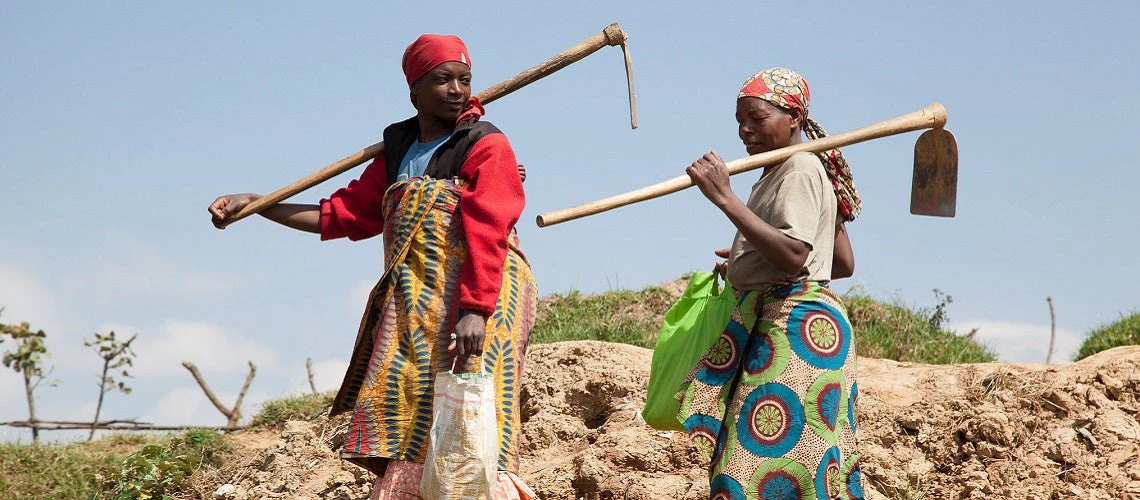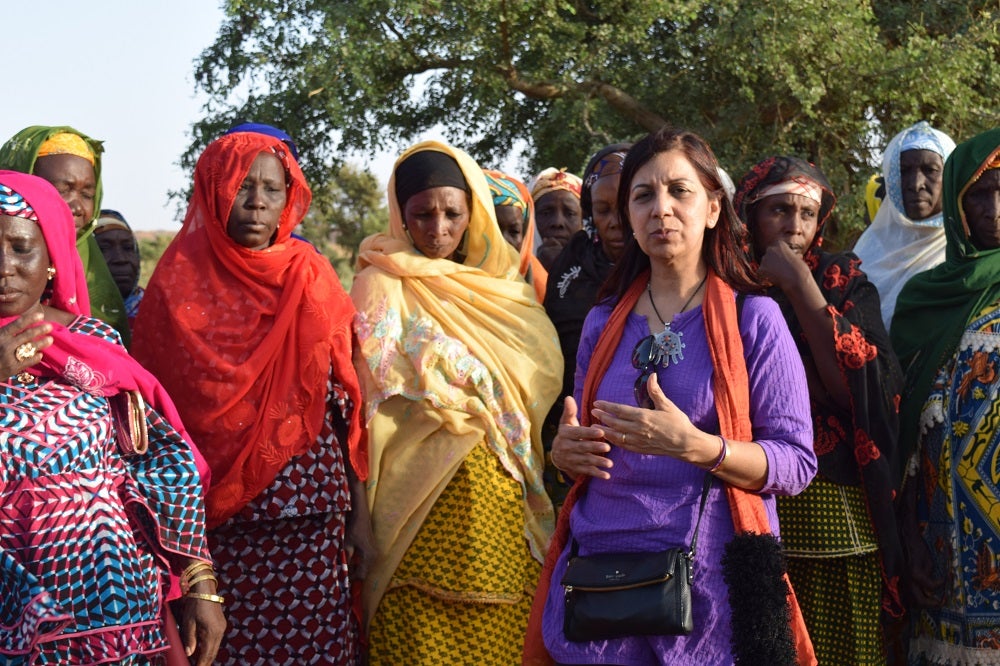 Women farmers from Rwanda in a field holding hoes
Women farmers from Rwanda in a field holding hoes
This fiscal year, the World Bank Group’s first-of-its-kind Action Plan on Climate Change Adaptation and Resilience comes into effect. This interview is part of a series reflecting on our work supporting countries to adapt and build resilience to a changing climate, focusing on early efforts, current projects and future innovations that aim to protect communities around the world.
Hear from Kanta Kumari Rigaud, Lead Environmental Specialist and Regional Climate Change Coordinator at the Africa Region, whose work over the years has focused on advancing climate policy and action on the ground through frontier analytics and knowledge development. Most recently, she led the development of the Next Generation Africa Climate Business Plan which was launched today.
1. As a pioneer on adaptation and resilience at the Bank, what led you to the realization that you needed to include resilience thinking and approaches in your work? What motivated you to keep going?
I joined the Climate Change Group in February 2011 from the Middle East and North Africa (MENA) region where, as an environmental specialist, I had worked on a range of natural resource management projects, including ecosystem management covering multiple protected areas in Jordan and agrobiodiversity conservation in the rainfed highlands of Yemen.
It had become abundantly clear that the traditional practices that communities in the MENA region had cultivated over the centuries were being challenged by increasing climate variability. We mobilized a diverse set of resilience strategies to secure livelihoods, often harnessing the rich indigenous knowledge of communities: from promoting small-scale medicinal herbal industries and conservation-oriented livestock grazing strategies in Jordan to the conservation of soil and water on terraced landscapes, and encouraging the cultivation of heat- and drought-tolerant local seed varieties with farming communities in Yemen. Holistic and inclusive approaches, driven by communities and local institutions, are key to building resilience and advancing climate-smart planning and development, with an eye to both current and future climate risks.
Stepping in as the World Bank’s Focal Point for the Pilot Program for Climate Resilience (PPCR) provided me with the opportunity to promote the mainstreaming of climate resilience in core development planning. With colleagues at the Bank, I compiled the Top 10 PPCR lessons for mainstreaming climate resilience, drawing from foundational examples in countries like Zambia, Niger, Mozambique, Nepal and Bolivia. One of my highlights was meeting with the women farmers receiving community grants under Niger Community Action Project for Climate Resilience, and seeing first-hand how they were combining their local knowledge on the use of demi-lunes to enhance water conservation and increase productivity on their farms.

2. Are there aha-moments in your work on resilience where you felt what you were doing led to results or some significant insights that influenced others?
One big moment comes to mind: the release of the Bank’s flagship report “Groundswell: Preparing for Internal Climate Migration” which I conceived and led, working with Columbia University (CIESIN), CUNY Institute of Demographic Research and Potsdam Institute for Climate Impact Research, along with a core team at the Bank. The report launched in March 2018, putting attention on the potential of climate to drive large-scale migration within countries. The study put a human face to the climate-migration issue, revealing—through a robust and pioneering modeling approach that we developed—that we could have as many as 143 million climate-induced migrants by 2050 under a pessimistic scenario of continued greenhouse gas emissions and unequal development pathways in Sub-Saharan Africa, South Asia and Latin America. The report underscored the need for reducing emissions globally, but also called for concrete development action – including “adapt in place” measures that could avert distress-driven climate migration.
The report was particularly timely and contributed to the deliberations ahead of the Global Compact for Migration in December 2018 – the first, inter-governmentally negotiated agreement to cover all dimensions of international migration in a holistic and comprehensive manner. The report also informed other global processes and partnerships, including the UNFCCC’s Task Force for Displacement and the Platform for Disaster Displacement, as well as the Bank’s internal strategies such as the Adaptation and Resilience Climate Action Plan, the IDA-19 replenishment process, the Fragility Conflict Violence strategy, and most recently the Next Generation Africa Climate Business Plan.
I am proud to be co-leading the work to extend the Groundswell analysis to the other regions (such as East Asia and the Pacific, Middle East and North Africa, and Eastern Europe and Central Asia), and dive deeper to expand the diagnostics on climate migration in West Africa and the Lake Victoria countries, with an aim to drive policy-informed dialogue and action. Climate migration may be a reality, but it does not have to be a crisis – concerted inclusive development alongside reducing greenhouse gas emissions is vital.
3. What advice would you have for project staff across sectors and regions to integrate adaptation approaches, resilience thinking and climate risk management in their work?
One of the most positive aspects is just how widespread the resilience agenda is with colleagues today. At the same time, I know that many project staff are simply overwhelmed by the growing number of policy commitments they have to deliver on. I have two pieces of advice for them in the context of climate:
First, when conceiving of your project – pay attention to the underlying causes of the challenge within your project and assess how these will change over time. You may find that that climate is more likely – rather than less – to feature strongly over the longer period. Factoring climate risks in and giving them due consideration will lead to a better and more resilient outcome overall. This approach will also ensure that you meet the necessary climate commitments without chasing them in a piecemeal way afterwards.
Second, I would urge teams to make use of existing tools and resources that the climate change group and regional climate teams have compiled. I would urge my colleagues in the Africa Region to also check out the Next Generation Africa Climate Business Plan which provides the most recent and best evidence on key climate risks as well as a roadmap for action areas that embed resilience and adaptation as critical entry points. The report underscores a development-centered approach to climate action to deliver food security, promote clean energy, secure environmental stability, build resilient cities, and manage climate shocks.
4. What are your thoughts on climate adaptation and resilience in our current reality of the pandemic, and on what can be prioritized post-COVID?
COVID-19 is not just a tragedy at multiple levels, but a classic case of tragedy of the commons. It requires us to act not just for our individual welfare, but for the collective good of society. In that context, I see the COVID-19 crises as a stark and timely reminder of how we must confront the climate challenge – with urgency, with collective goodwill, and with extra sensitivity to those who are most at risk.
The crisis has put enormous strains on people and economies - especially the poorest and most vulnerable. But a cogent COVID-19 response cannot be one that postpones climate action. In fact, the case for resilience is amplified and even more urgent given how COVID-19 is disproportionately affecting the poorest. The Bank has already shown that synergies with climate action can be mobilized – for example through the Senegal Agriculture and Livestock Competitiveness Program for Results which will provide access to finance and insurance to producers in the extended Groundnut Basin and agro-pastoral areas.
A more critical lesson emerging from COVID-19 is the urgent need for systemwide readiness and end-to-end preparedness that involves all sectors and all people (households, institutions, communities, national governments, and international stakeholders) as well as anticipatory strategies to address borderless challenges such as pandemics and climate change. The Next Generation Africa Climate Business Plan sets out a blueprint for such systemic action for Africa and draws on our exceptional regional expertise and strong management engagement to deliver.


Join the Conversation